WIU Adapted Physical Activity Motor Clinics for Special Ed Students Evolve with iPad App Use
December 1, 2015
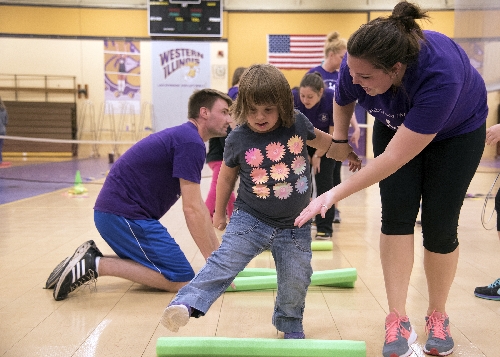
Alisa Boeke, a West Central Illinois Special Education Cooperative (WCISEC) student, takes part in one of the Western Illinois University Department of Kinesiology's Adapted Physical Activity Motor Clinics. WIU students from three different disciplines—kinesiology, special education and communication sciences and disorders (CSD)—work with the WCISEC clinics, which are held in the Brophy Hall gymnasium and pool.
[Download Print-Quality Image]
WIU faculty members and students from three different disciplines are partnering with the Chicago-based app development company, Exercise Connection, to enhance an award-winning, "pioneering" adapted physical activity Motor Clinic for west central Illinois special education students.
MACOMB, IL — The sounds of children engaged in boisterous activity have reverberated through Western Illinois University's Brophy Hall Gym several Friday mornings this semester. Working in and amid the noisy action—which is made by about 60 school-age kids from the West Central Illinois Special Education Cooperative (WCISEC) engaged in physical activity—are WIU students from three different disciplines—kinesiology, special education and communication sciences and disorders (CSD)—as well as faculty and alumni from the various areas of study represented.
"This is an extraordinary thing we're doing here," noted Lauren Brozman, a graduate student in the WIU Department of Kinesiology's graduate sport management program. "I hope this shows people everywhere, including our legislators, that higher education is very important. Without it, Western students who are delivering and learning from experiences in adapted physical education like this—which Dr. [Cindy] Piletic and other faculty here at Western have been providing for years for WIU students, as well as for the WCISEC kids—wouldn't be possible."
Brozman, who earned a B.A. in political science from WIU in 2008 and a B.S. in physical education K-12 in 2011, is referring to Piletic's award-winning Motor Clinic, which enables WIU students studying kinesiology, special education and CSD (speech and language pathology) to work directly with the WCISEC students through the Motor Clinic, held about seven times each semester in Brophy Hall.
According to WCISEC's Carie Johnson—who worked in the Motor Clinics as part of her graduate program at Western back in 2003—the clinic is, indeed, beneficial for the Western students. And for the kids from area counties who come to WCISEC for services, it provides a complementary program to the adapted physical education services provided within every WCISEC student's school day.
"It's important for us to be able to utilize this service Western offers. This is a chance for our students to get one on one with WIU students and to have those hands-on learning experiences, to build upon what we work on in the classroom. We appreciate the opportunity of being able to come here. Every year, when I start the school year, the kids in my program will say hello to me and almost immediately, their next question is, 'When do we start going to Western?' They remember year after year, and they love it," explained Johnson, who earned both her B.S. and M.S. in kinesiology from WIU.
In 2014, Piletic and her colleagues were honored by the American Alliance for Health, Physical Education, Recreation and Dance (AAHPERD, also known as "SHAPE America") for the Adapted Physical Activity Motor Clinics. The award recognizes outstanding community-based programming designed for improving the lives of individuals with disabilities (see www.wiu.edu/news/newsrelease.php?release_id=11656). According to Piletic, the Motor Clinics would not be possible without the support of the WCISEC and the young students who come to Western's campus Friday mornings.
"We have a multidisciplinary team—the physical educator, the special educator and the speech and language pathologist—working with the students, so we're building on that concept of collaboration that our undergraduate and graduates students, once they graduate from Western, are going to see in the schools. I think the SHAPE America recognition came about because of that collaboration. Based on my experience in the adapted physical education world, I have seen few programs bringing in the speech and language people and the special educators like we do," Piletic said.
Another Perfect Partner: ExerciseBuddy
It is this multidisciplinary approach that drew the attention of David Geslak, owner of the Chicago-based company Exercise Connection (see exerciseconnection.com). In 2014, Geslak started selling an iPad app called "ExerciseBuddy," which helps solve the problem of introducing exercise to individuals with autism. Geslak, who has been working with individuals with autism for more than 10 years, describes Western's multidisciplinary approach to working with the students from WCISEC as "innovative."
"The students' and faculty members' use of ExerciseBuddy was a complete coincidence," Geslak said. "My wife, Jessica, a speech-language pathologist and part of the ExerciseBuddy development team, saw Amy Burke (instructor in the WIU Department of Communication Sciences and Disorders) present at the Illinois Speech-Language-Hearing Association Convention last year. Amy's presentation focused on inter-professional education and the benefits of movement in speech and language production."
After seeing Burke's presentation, Geslak's wife told her about ExerciseBuddy, and Burke expressed interest.
"So I reached out to Amy, and she invited me to Macomb last spring. There, I met Dr. Piletic, observed the clinic and was inspired by the collaboration among Amy's CSD students, the special education teacher candidates and Dr. Piletic's kinesiology students," Geslak noted. In the public school system, a shift is happening for a cross-curriculum approach to better educate students with autism. Educators are trying to figure out a curriculum that works, and faculty and students at Western are pioneering an approach that takes into account all the nuances and realities of this challenging population."
After Geslak's visit to Western last April, a few months later, Piletic and Geslak met again at a National Consortium for Physical Education for Individuals with Disabilities (NCPEID) Conference, where Geslak presented ExerciseBuddy to professionals who work with individuals with disabilities.
"Dave had made some updates to ExerciseBuddy, which I knew could benefit our WIU students and the children we are working with; I want future teachers ready and equipped with all the best tools as they begin their careers as physical and adapted physical educators," Piletic explained. "Dave and I come to this from two different perspectives, and together, we were able to customize ExerciseBuddy to fit the needs of future teachers and the children they will be educating. This is a game changer for bringing together a cross-curriculum approach."
According to Geslak, ExerciseBuddy uses four types of evidence-based teaching practices proven to benefit autism: exercise, visual supports, video modeling and technology-aided instruction. Using the app, the user (parent, educator or professional) can set up an exercise routine.
"In addition to the health-related benefits of exercise, it is also proven to enhance the child's focus, and reduce his or her stress and maladaptive behaviors, which are present in the autism population," Geslak added.
Prior to using ExerciseBuddy, the WIU students and faculty had been using paper-based visual supports to introduce exercise.
"But research demonstrates that individuals with autism are better engaged with technology. ExerciseBuddy's use of video-modeling (30-second videos of individuals performing an exercise), visual countdown boards, as well as its structured exercise routines, are making a difference for both the WIU students and the individuals with autism. The video-modeling functionality has made the greatest impact. The WIU students or I may demonstrate an exercise, but many children would still be confused about what to do. But when watching the ExerciseBuddy videos, a proven teaching strategy, these children are more engaged and doing meaningful physical activity. It's incredible to watch this happen," Piletic noted.
The iPads used in the Motor Clinic are part of a grant awarded from IAHPERD to Piletic and Cathy McMillan, assistant professor in the WIU Department of Kinesiology's exercise science program. They are using the devices and ExerciseBuddy in a tandem research project entitled, "Impact of the iPad on Physical Activity Levels of Young Adults with Intellectual Delays and/or Autism." (See "Exercise Science Students Involved in Cutting-Edge iPad Research Project for Students with Autism.")
Educational Opportunity, Personal Growth
In the Motor Clinics, the WIU students work with the WCISEC students for about 60 minutes in the Brophy Hall gym in various physical activities and then another 30 minutes with them in the Brophy Hall pool. The opportunity is not only beneficial for their studies and individual skill sets, but it is also one that yields great personal reward.
"I began volunteering when I was a sophomore, and this is my fourth semester," explained Ashley Gerard (South Elgin, IL), a senior special education major. "It used to be required as part of the special education curriculum, and we would take the class alongside other WIU students in the Motor Clinic. It has since been taken out of special education curriculum, so to help keep the clinics running, students in an organization I'm involved with, the Council for Exceptional Children [CEC] here at Western, began collaborating with Dr. Piletic. Now, CEC members volunteer to help with the clinic."
Gerard noted through her work at the clinics, she has learned to collaborate with different types of educators.
"I've learned a lot about adapted physical activity, too, and how motor skills complement cognitive learning. It's just been a big educational experience. As you're becoming a teacher, you learn mostly about the classroom and what to do in the classroom—basically how to teach stuff. In the clinic, it is a different environment. The students are running and moving. It's awesome to see that side of their development," she said.
"It's that real-life, hands-on experience as an undergrad teacher candidate you strive for," Brozman added. "It's impossible to put into words how truly rewarding this is. I always like to tell the story about one student with autism who I worked with. When I was an undergraduate student working at the clinics, this student was just a little tot, and her first experience in the pool was with me. She went from being scared of the water, to getting her hair wet, to putting her face in the water. Now, she's in middle school, and she's swimming in the deep end. This is the progress she made from her participation in the WIU Motor Clinic. To see that progression—and the standard that we set here for our students to achieve—well… that is beyond description."
For Burke's graduate students in the CSD program, working with the WCISEC students in the clinics has helped to expand the way they work with individuals with autism, as well.
"One of the best things I have noticed is that we now utilize movement in our Speech and Language Clinics. Now, it's not as much about sitting at a table working on worksheets together. My graduate students are incorporating physical activity when they work with the students. They're jumping and doing all sorts of physical movement, which we know enhances language development," Burke noted. "The other thing my students learn is how to collaborate and work with other educators and specialists. They become aware about how other disciplines can contribute and complement their therapy. Through collaboration, they can incorporate other people's ideas into their work, which can benefit the students with autism," she added.
WIU Department of Kinesiology Chair Janet Wigglesworth said the Motor Clinic is one of the exceptional programs Western not only offers its students, but also to the community in west central Illinois and beyond.
"We've got great things going here with our adapted physical education program, as demonstrated by the award Dr. Piletic and her colleagues won last year. Dr. Piletic is an important leader in the program," Wigglesworth noted. "We are one of the few physical education teacher education programs in Illinois that requires our students to take multiple courses in adapted physical education, so when they leave WIU and go out to become physical educators, they have a good background to be able to work with all students."
For more information about the Motor Skills Clinics and the use of ExerciseBuddy in them, contact Piletic at (309) 298-1058 or via email at C-Piletic@wiu.edu.
For more information about the West Central Illinois Special Education Cooperative (WCISEC), visit www.wcisec.org.
For more information about ExerciseBuddy, go to exercisebuddy.com or exerciseconnection.com.
Posted By: Teresa Koltzenburg (WIUNews@wiu.edu)
Office of University Communications & Marketing

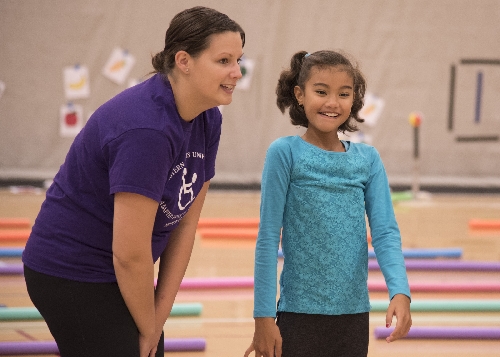
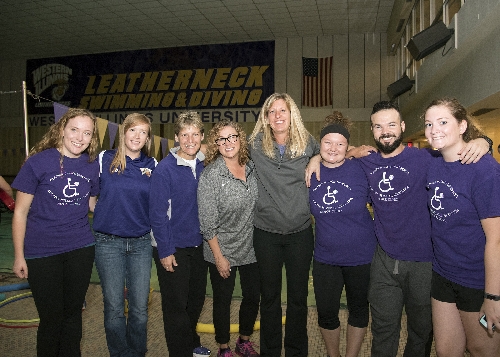
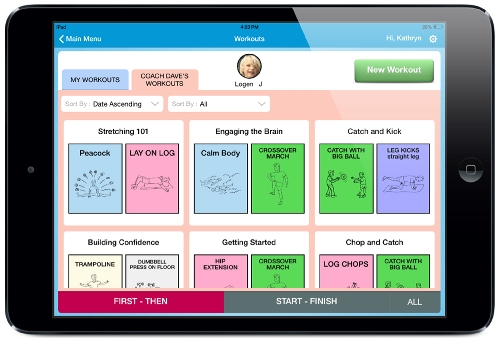
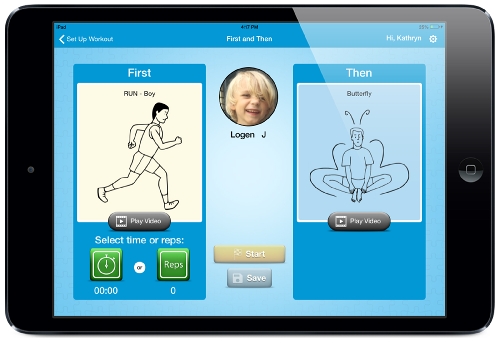
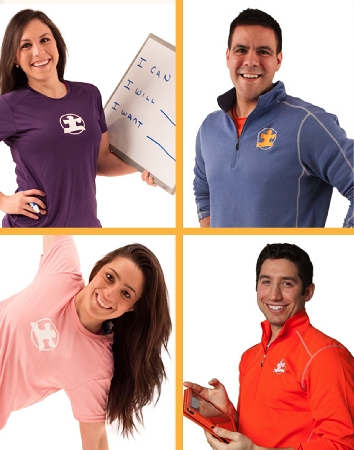
Connect with us: